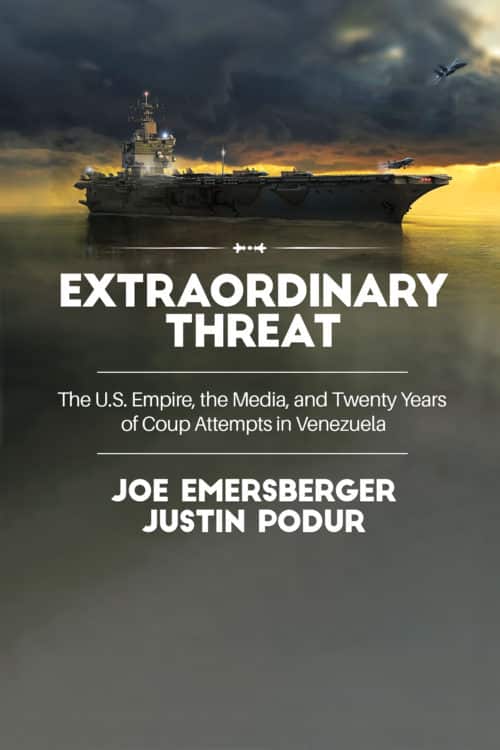“I’d like you to lay out the ‘Why?'” Rania Khalek asks Justin Podur, in a discussion of his new book, Extraordinary Threat: The U.S. Empire, the Media and Twenty Years of Coup Attempts Against Venezuela coauthored with Joe Emersberger.
In March 2015, President Obama initiated sanctions against Venezuela, declaring a “national emergency with respect to the unusual and extraordinary threat to the national security and foreign policy of the United States posed by the situation in Venezuela.” But why does the United States utterly disrupt or destroy countries like Venezuela, especially when (although the American capitalist establishment may feel threatened by Venezuela’s possession of its own oil reserves), the country does not actually pose a military threat to the United States?
Justin Podur: “They do it with other countries too, like they do it with Cuba… I think it was Chomsky that pointed out, you don’t compare Cuba to the U.S. with Cuba…you should compare Cuba to Jamaica, Cuba to Haiti, those are the relevant comparisons… We go quite a bit into the comparisons between Venezuela and Colombia, because they were so close, they were part of the same country, they were liberated at the same time, they’re culturally very similar…and the differences between what goes on in Colombia in terms of enforced mass disappearances, mass displacement… What they’re doing in Colombia is what they say is happening in Venezuela. You know what I mean? Like Israel (says), ‘Palestinians teach their children to hate and it’s because….”
Rania Khalek: “And Israelis are literally on video telling their children to hate…
…The point is to say, the weaponization of human rights, and the whole human rights industry, whether it’s Amnesty International, Human Rights Watch, all of these civil society groups that are essentially funded by American oligarchs through various foundations that are closely aligned with American foreign policy interests, or in some cases, directly, by U.S. government affiliated organizations like the National Endowment for Democracy….Can you talk a bit about this tool in the sort of regime change toolbox, the weaponization of human rights (discourse) and the organizations behind it.
Justin Podur: “…They developed this specifically as an anti-Communist politics. Because they were like, Communism has these things people like.
Like you were saying, they’re going to feed everybody, everybody’s gonna read, and everyone’s going to have some land. How are we gonna compete with that? Well, they said, we’re going to compete with that by having – we can’t just compete with that by saying, “anti”, “we’re anti-that.” So they were like, anti-Communism isn’t good enough, we’re going to have “rights and democracy”
…and then they have the way that Americans do things, which is, they quantify it, and then they have these reports, they get into the details of the law. So, with Human Rights Watch, it’s incredible, because the way they define things in these legal terms – they’re not against aggression…Aggression is not a “rights” issue. They’re not against “war” per se, you know they’re not against “sanctions” per se…
Watch the rest of the conversation below, or on the podcast Unauthorized Disclosure, hosted by Rania Khalek and Kevin Gosztola
(Just a little side note: Seems like Justin Podur never misses a chance to suggest people read Fanshen, published by Monthly Review Press: “you ever read that book Fanshen? …There’s a chapter at the beginning, where, if you were a peasant in China, you had to go to the bathroom on the landlord’s property, like in the landlord’s toilet, because he had a right to your nightsoils…”)


Comments are closed.